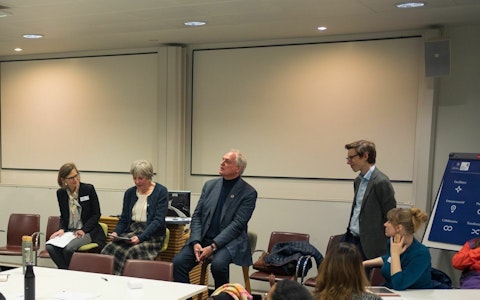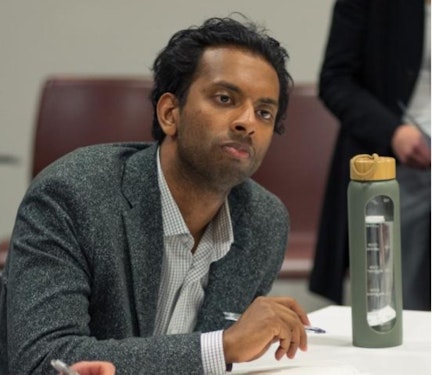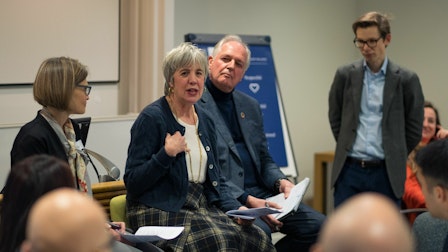Anderson Petergeorge, GLI 2023, was invited by The Oxford Character Project to join 'The Future of Leadership', a discussion with Kim Polman and Paul Polman, which was co-sponsored by the Skoll Centre for Social Entrepreneurship. The discussion centred on the question:
What is the future of leadership in a rapidly changing world, full of opportunities and challenges?
Following the event, Anderson wrote a blog post on the future of leadership and posed ten questions to current business leaders. You can read the entire post below.
Original post source: https://www.sbs.ox.ac.uk/oxfor...

The future of leadership: ten questions for business leaders
What are the key questions we as a society should focus on around the future of leadership?
This was one of the prompts we received as a group during a roundtable discussion on 'The Future of Leadership', co-sponsored by the Oxford Character Project and the Skoll Centre for Social Entrepreneurship.
The discussion brought together an invited group of approximately 20 senior business leaders, 15 Oxford leadership academics, and 20 Oxford graduate students, to exchange perspectives on the kind of leadership that is needed to drive organizational purpose and business success. As a current MBA student and participant of the Global Leadership Initiative (GLI) programme, I found the conversation elevated many of the topics we discuss on a weekly basis at our GLI sessions around values and ethics in leadership. Discussions around the future of leadership are ever more timely today with the climate, economic and humanitarian crises we face across the globe.

We were joined by Kim Polman (Chair of Reboot the Future), and Paul Polman (Business leader, climate and equality campaigner, co-author of 'Net Positive: how courageous companies thrive by giving more than they take'- a Financial Times Business Book of the Year). Kim and Paul kicked off the discussion by sharing insights from their extensive experience of leadership in business and social impact organizations.
As a group, we were able to come up with a multitude of thought-provoking questions to continue being discussed throughout our careers. Below are ten examples of questions that surfaced from our discussions.
What can we do to get more cross-generational collaboration and voices in our decision making?
As leaders, how do we work to change current metrics and measurements focused on profit-maximization at the detriment of society?
How do you empower people to be courageous within systems of power?
How do we conceptualize impact beyond ESG?
As leaders, how do we reignite faith in our team?
Do we as leaders spend enough time reflecting and aligning our own values
Do organizations have a clear idea of the values they stand for and promote?
8. How can we move to a more decentralized leadership model?
9. How do we bring currently invisible voices to the tables?
10. How can we combat short-terminism in our goal setting?
A few notable quotes from the participants and speakers that left a mark on all of us from the discussion:
'Leadership that got us here is not what will get us out'
'Putting yourself in service of others is also in your best interest'
'When you bring like-minded people together they become much more courageous as they tend to rise to the common denominator'
'Balance is found between competition and cooperation'
As MBAs, looking to re-enter the workforce with aspirations to lead teams and organizations, these questions are critical for us to consider during and after the MBA to become ethical and successful leader. Whether it’s in our classroom sessions in courses such as Capitalism in Debate, in our GLI weekly sessions on developing our character or even a casual coffee in the Oxford Saïd cafeteria, I am looking forward to continuing these discussions with my MBA peers.

Anderson is currently pursuing an MBA at Saïd Business School and a Masters in Advanced Education Leadership at the Harvard Graduate School of Education. Anderson is passionate in finding innovative solutions at the intersection of business and education to help maximise and unlock individual human potential.
Prior to his studies, Anderson was the Director of Operations at Apollo School, an institution focused on preparing students ages 10-13 to be leaders in a constantly evolving future. Anderson started his career as a Chartered Accountant, moving to be an Investment Banker focused on power & renewables and then a Private Equity investor investing pension contributions globally on behalf of Canadian beneficiaries. Anderson is also passionate on all things mental health awareness, yoga & movement and social mobility.
Anderson is a member of the GLI 2023 cohort in the Business & Entrepreneurship stream.
Original post source: https://www.sbs.ox.ac.uk/oxfor...
